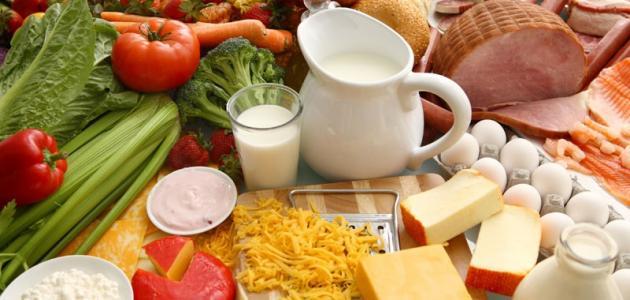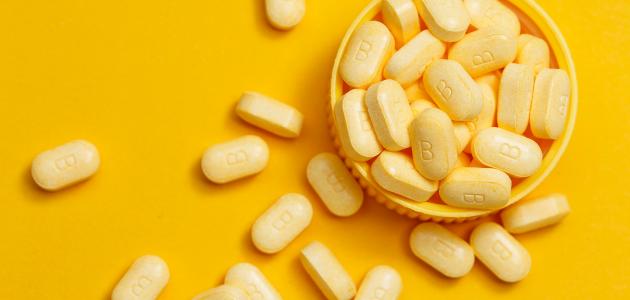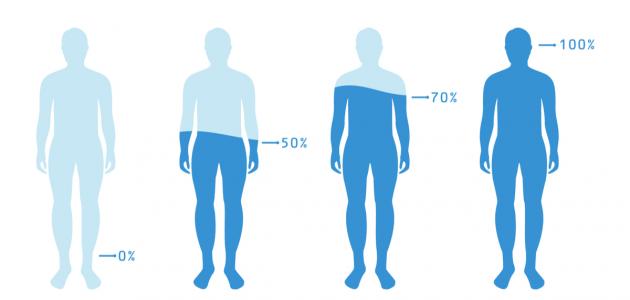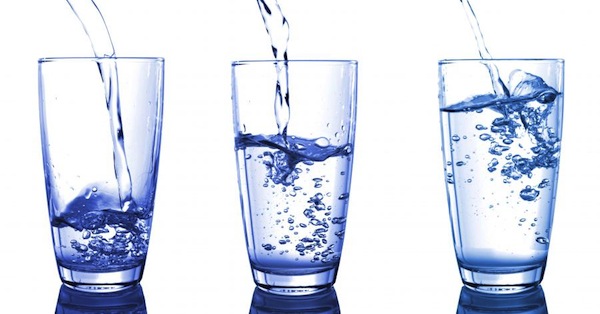Contents
Vitamins
The body gets vitamins from different foods, as these vitamins are organic compounds that the body needs small quantities of them and cannot produce or provide them in sufficient quantities, so it needs them from external sources, and there are thirteen types of vitamins, where the amount that the body needs varies from each type And each vitamin has a specific function that it performs, and these compounds are classified into two main types: Soluble vitamins in water, soluble vitamins in fat - soluble vitamins body and stored in fat easily and can be absorbed in the intestine, and the soluble vitamins in the water body can not keep them. [1]
Types of vitamins, their benefits and sources
Vitamin A
Vitamin A is considered one of the vitamins important for human development and growth, and it is considered essential for vision, the immune system, reproduction, and other functions, and it is a powerful antioxidant, and it has an effect on gene expression and phenotype because it works in the body like a hormone, and there are This vitamin is in many food sources; Fatty fish, meat, dairy products, cheeses, eggs, liver, and fish oil , in addition to orange vegetables and fruits rich in beta-carotene such as broccoli, squash, and others. Pregnant women and people who live in developing countries are most vulnerable to deficiency of this vitamin, and there are many benefits of vitamin A, including: [2]
- Reducing the risk of cancer, especially lung , prostate and colon cancer.
- Contribution to the treatment of type 2 diabetes patients, as it helps to restore the blood sugar level to normal, according to a study conducted on mice.
- Promote healthy skin and hair , through the role of this vitamin in building body tissues.
Vitamin E.
Is vitamin E antioxidants that protect body cells from damage, one of the types of vitamins , fat - soluble, so the body can store, and there is this vitamin in many food sources; Sunflower seeds, hazelnuts, almonds, peanuts , spinach, broccoli, kiwi fruits, tomatoes, and mangoes, and it can also be obtained by taking nutritional supplements, and this vitamin has many health benefits, including: [3]
- It can help repair damaged cells in the body.
- Reduces the damage caused by free radicals.
- It slows down the aging process of body cells.
Vitamin D
The body can produce vitamin D when exposed to sunlight, so it is called the sunshine vitamin, and this vitamin is considered one of the essential elements for the health of bones and teeth, and it is one of the fat-soluble vitamins, and to take the body's need from this vitamin, it is estimated that exposure to sunlight from two to two times Three every week for five to ten minutes a day to allow the body to produce it, and from its other sources; Cod liver oil, eggs, tuna, salmon, sardines, maitake mushrooms, and skimmed milk, has many health benefits, including: [4]
- It helps the body absorb calcium in the intestine, which contributes to promoting bone health .
- It reduces the chances of getting the flu.
- Reduces the risk of developing diabetes.
- It improves children's health, while its deficiency is associated with an increased risk of some diseases such as childhood atopic dermatitis and others.
- Contributes to maintaining the health of the pregnant woman and the fetus during pregnancy.
- Helps prevent cancer.
Vitamin K.
Vitamin K is one of the fat-soluble vitamins, and it is one of the important vitamins that the body needs to produce the protein that clots the blood and renews the bones, and this protein is called prothrombin. That the blood needs to clot, which increases the risk of bleeding, and vitamin K is found in many food sources; Such as green leafy vegetables, meat, eggs, dairy products, vegetable oils, and some fruits; Like grapes, in addition to that it has many health benefits, including: [5]
- Promote bone health, by improving bone density and preventing fractures.
- Promoting cognitive health; Such as improving episodic memory and verbal memory in the elderly.
- Promote heart health , by contributing to lowering blood pressure and reducing the risk of strokes.
vitamin C
It is the vitamin C of the most effective food, a water - soluble vitamins, and has many food sources; Such as melon, orange juice, broccoli, green pepper, red cabbage, kiwi, and tomato juice, and this vitamin contributes to providing the body with many benefits, including: [6]
- It reduces the risk of strokes.
- It reduces the appearance of signs of aging such as wrinkles and dry skin.
- Improves macular degeneration.
- Reduces the risk of infections.
- Reduces the risk of cardiovascular disease and cancer.
Vitamin B1
Vitamin B1 is also called thiamine, and it helps the body use carbohydrates as an energy source, which is one of the vitamins dissolved in water, and the excess body excretes them in the urine, and this vitamin deficiency can be associated with mental problems, such as confusion or short-term memory loss, and it can also This is to weaken muscles and other symptoms, and this vitamin is found in a number of food sources; Such as whole grains, meat, yeast, nuts, liver, eggs, and some vegetables and fruits, such as cauliflower, potatoes, and asparagus, and on the other hand, vitamin B1 has many benefits, including: [7]
- It helps prevent any complications in the brain, nervous system, stomach, intestines, heart and muscles.
- It contributes to the process of electrolyte flow to and from nerve and muscle cells.
- Reduces the risk of developing beriberi, which causes disturbances in the nerves, digestive system and heart.
Vitamin B2
Vitamin B2 or riboflavin, like other B vitamins, is one of the vitamins dissolved in water, and the body stores very small quantities of it, so its sources must be consumed on a daily basis to take the adequate amount of this vitamin, and from its sources; Eggs, milk products, fortified cereals, molasses, wholegrain bread, yeast extract, meat, fish, mushrooms, liver, kidneys, and some vegetables such as artichokes, avocados , and many other sources, and this vitamin is considered one of the vitamins beneficial to the body as it has many Of the benefits, including: [8]
- Maintaining the health of the liver.
- Maintain healthy skin, eyes, nerves and muscles.
- Contribute to the absorption of iron, folic acid, and all of vitamins B1, B2 and B3.
- Contribution to the production of adrenal hormone.
- Help prevent progression of cataracts to the eyes.
- Contribute to the development and growth of the fetus.
- Preserving the mucous membranes in the digestive system.
Vitamin B3
Vitamin B3, or niacin as it is called, helps convert food in the body into energy, and thus it helps the human body use fats and protein, and contributes to maintaining the health of muscles, skin, and hair, and this vitamin deficiency is rare in the United States, and it can cause deficiency. Niacin is for people who drink a lot, suffer from anorexia nervosa, or who have undergone bariatric surgery, and this vitamin is found in some food sources; Like liver, heart, kidneys, beef, meat, poultry, fish , legumes, eggs, mushrooms, leafy greens, nuts, and others. Vitamin B3 has many benefits, including: [9]
- Reduces the risk of developing cardiovascular disease.
- Helps treat high cholesterol.
- It can contribute to lowering blood pressure.
Vitamin B5
Vitamin B5 helps to break down fats and carbohydrates and convert them into energy, in addition to aiding in protein metabolism, and has many sources, such as meat, chicken, kidneys, liver, whole grains, legumes such as lentils and soybeans, dairy products, and some vegetables Like mushrooms, sweet potatoes, broccoli, corn, cauliflower, and others, and it has many health benefits, including: [10]
- It moisturizes the skin and helps heal wounds in the skin, and it can also reduce the acne problem.
- Helps reduce cholesterol and triglycerides in the blood.
- People with rheumatoid arthritis have low levels of vitamin B5, and more studies are needed to prove this.
Vitamin B6
Vitamin B6, or pyridoxine as it is called, contributes to maintaining the functioning of the nervous system and the brain, as it has a fundamental role in building hemoglobin, which transports oxygen to various parts of the body, and from food sources rich in vitamin B6; Beef, chicken, fish, chickpeas, whole grains, nuts, bananas, potatoes, and fortified cereals, and it can also be eaten through nutritional supplements, and this vitamin has many benefits in the body, including: [11]
- Contributing to the healthy development of children’s brain, and maintaining brain functions in adults.
- Help regulate the biological clock for sleep.
- It can reduce the risk of strokes, Alzheimer's disease and depression.
Vitamin B7
Vitamin B7 or biotin is one of the important vitamins for the stage of pregnancy and lactation, and it helps some enzymes to perform their functions, such as carboxylase enzymes that contribute to the production of amino acids and glucose, and eating raw eggs can lead to a deficiency in biotin, but this case is rare, on the other hand. There are many food sources for this vitamin, such as liver, kidneys, yeast, egg yolks, cheese, legumes, green leafy vegetables, mushrooms , nuts, and other sources. Among the benefits of this vitamin are the following: [12]
- Contribute to the production of energy in the body, through its work as an assistant to several enzymes that contribute to the metabolism of fats, proteins, and carbohydrates.
- Promote healthy skin and hair.
- Lowering the blood sugar level in people with diabetes.
- Contribute to strengthening weak nails, and one study found an improvement in nail thickness by 25% when taking 2.5 mg of biotin supplements daily for 6-15 months.
Vitamin B9
Vitamin B9, in its water-soluble form called folic acid, is the main component of DNA, and also contributes to the formation of red blood cells, and maintains the health of the brain of infants, and women during pregnancy are usually given adequate amounts of folic acid to prevent birth defects or death of the fetus. This vitamin is found in many natural sources, the most important of which are: Kidneys, liver, lentils, milk, spinach, egg yolks and other sources. This vitamin has many benefits, including: [13]
- Reducing the child's risk of developing autism.
- Reducing the risk of developing cleft lip.
- Use it in combination with a treatment called Methotrexate for patients with rheumatoid arthritis.
Vitamin B12
Vitamin B12 is considered one of the essential vitamins for the health of brain function, and it is involved in the manufacture of red blood cells, so a deficiency of this vitamin can lead to anemia and neurological disorders, and this deficiency usually affects vegetarians, so you should take vitamin B-12 supplements if you follow this. Diet, and this vitamin can be taken from some food sources; Like meat, poultry, fish, eggs, dairy products, nutritional yeast products, and vitamin B12 has many benefits, including: [14]
- It is involved in the formation and regulation of DNA.
- It has an important role in the synthesis of fatty acids and in the body's energy production process.
- It helps the body absorb folic acid.
- It helps in the proliferation of red blood cells, the loss of which leads to anemia.
References
- ↑ Christian Nordqvist (26-9-2017), "Vitamins: What are they and what do they do?" , Www.medicalnewstoday.com The , Retrieved 5-8-2018. Edited.
- ↑ Megan Ware (11-1-2018), “Everything You Need to Know About Vitamin A , ” www.medicalnewstoday.com . Edited.
- ↑ Deborah Weatherspoon (28-7-2016), "The Benefits of Vitamin E" , www.healthline.com , Retrieved 5-8-2018. Edited.
- ↑ Megan Ware (13-11-2017), "What are the health benefits of vitamin D?" , Www.medicalnewstoday.com The , Retrieved 5-8-2018. Edited.
- ↑ Megan Ware (22-1-2018), "Health benefits and sources of vitamin K" , www.medicalnewstoday.com , Retrieved 5-8-2018. Edited.
- ↑ Kathleen M. Zelman, "The Benefits of Vitamin C , " www.webmd.com , Retrieved 5-8-2018. Edited.
- ↑ Christian Nordqvist (22-11-2017), "What is thiamin, or vitamin B1?" , Www.medicalnewstoday.com The , Retrieved 5-8-2018. Edited.
- ↑ Christian Nordqvist (7-3-2017), "Benefits and sources of vitamin B2" , www.medicalnewstoday.com , Retrieved 5-8-2018. Edited.
- ↑ Christian Nordqvist (7-10-2016), "Why do we need vitamin B-3, or niacin?" , Www.medicalnewstoday.com The , Retrieved 5-8-2018. Edited.
- ↑ Christian Nordqvist (24-4-2017), “Vitamin B5: Everything You Need to Know” , www.medicalnewstoday.com , Retrieved 5-8-2018. Edited.
- ↑ Katherine Lee (25-9-2017), “The Health and Brain Benefits of Vitamin B6” , www.everydayhealth.com , Retrieved 5-8-2018. Edited.
- ↑ Hrefna Palsdottir (16-3-2018), "What are the health benefits of biotin?" , Www.medicalnewstoday.com The , Retrieved 5-8-2018. Edited.
- ↑ Christian Nordqvist (27-10-2017), “What to know about folic acid” , www.medicalnewstoday.com , Retrieved 5-8-2018.
- ↑ Christian Nordqvist (28-11-2017), "Everything you need to know about vitamin B-12" , www.medicalnewstoday.com , Retrieved 5-8-2018. Edited.





